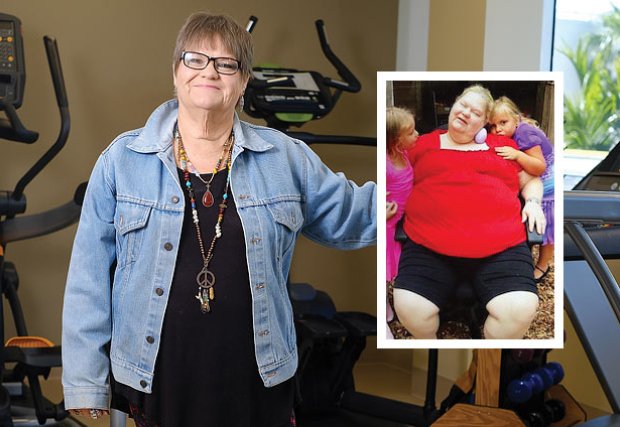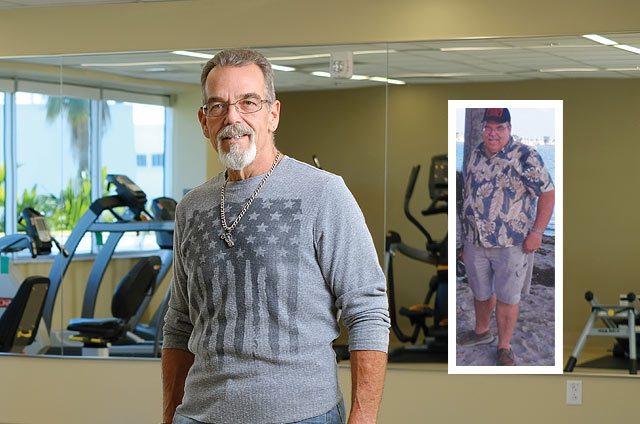Rebecca Massey then and now.
Rebecca Massey, 60, battled her weight all her life. She loves to cook, but remembers spending holidays with a chair pulled up to the kitchen counter because she couldn’t stand for long periods of time or move around easily.
The breaking point came when her grandson asked her to take him to the park, and she couldn’t. She has six kids, 10 grandchildren, three step-grandchildren and one great grandchild, and wants to be an active part of their lives. Determined to turn her health around, she underwent gastric bypass surgery at Wellington Regional on October 28, 2016.
She initially lost 60 pounds before taking a trip out west with her brother and sister-in-law, where her weight continued to drop. In the weeks she was away, she spent days walking and sightseeing. “By the time I was back from my trip, I’d lost another 60 pounds,” she says.
Today, she is down 145 pounds from her starting weight. She’s been able to cut way back on the medicine she takes to control her diabetes, and she no longer needs insulin. She has also changed her eating habits and committed to a healthy lifestyle. “Weight-loss surgery has taught me that I can eat a little bit of food, and I’m good,” she says. “I go back for vegetables. They are what I eat.”
One of the most fun things has been buying clothes. She says she couldn’t wear bell bottom pants when they were in style years ago, but now she can wear them and she feels really good. Also, instead of spending most of her time at home, she now gets out frequently for shopping and other activities, and she’s thinking about joining a water aerobics class.
“I would tell anybody to do it,” she says of weight-loss surgery at Wellington Regional. “The hospital was great, the people there with me were great. I feel like a whole new person,” she says. “You have no idea how happy I am.”
"I felt so good after the surgery." — William Tozer
William Tozer’s transformation.
For William Tozer, 58, the decision to get serious about weight loss started when he saw a picture of himself on the beach, weighing 100-plus more pounds than he did at his retirement.
He is a military veteran who was injured in the service, and then worked as a police officer for 18 years. “It just sneaks up on you,” he says of the excess weight.
When he found out that the laparoscopic sleeve gastrectomy procedure was available at Wellington Regional, he wanted to do it. This operation involves removing a large portion of the stomach and leaving a narrow gastric tube or “sleeve.” This increases the feeling of fullness and reduces appetite.
After following a regimented pre-surgical diet, he had the procedure on March 31, 2016. “It was great,” he says. “The pain level was so low.”
Since then, he’s gone from size 46 pants to size 32, and from 341 pounds to 195 pounds. “If you follow the rules, you can’t help but lose the weight,” he says.
Having the surgery has also improved his health. “I used to be on a CPAP machine (for sleep apnea) that I no longer need,” he says. He walks five miles every day, rain or shine, and is dancing again with his wife, who has gotten healthy and lost weight with him.
He recalls how supportive the hospital staff was, noting how Amy Noe, manager of the weight and wellness program, gave him her cell phone number from the very beginning. Now he is giving back by sharing his experience with others, and he is a regular at the bariatric support group meetings. The group is welcoming and friendly, and it’s motivating for him as well, he says. “It’s like Rocky Balboa coming back into the ring,” he says. “To see other people losing the weight, it’s just a big boost.”
Are You Considering Weight-Loss Surgery?
Weight-loss surgery can provide an effective option for select patients who have been unable to lose weight with other methods. In order to maintain long-term results, it involves making a lifelong commitment to healthy eating habits and behaviors.
Bariatric procedures at Wellington Regional are performed by Srinivas Kaza, MD, FACS, a board-certified general surgeon and director of robotic, bariatric and minimally invasive surgery. An important thing to keep in mind, he says, is the harmful effect of repeatedly losing and regaining weight. This cycle of “yo-yo dieting” can alter the body’s metabolic rate (how it burns calories) and make people more susceptible to co-morbidities such as hypertension and diabetes.
The Bariatric Program at Wellington Regional has been accredited by the Metabolic and Bariatric Surgery Accreditation and Quality Improvement Program, which is the governing body for bariatric surgery. Several surgical options are available to help patients find what’s best for them.
A number of different factors are considered in determining who may be a candidate for weight-loss surgery, such as age, BMI (body mass index) and obesity-related co-morbidities. Free weight-loss seminars provide an opportunity to learn more.
Find out about upcoming weight-loss seminars >
Individual results may vary. There are risks associated with any surgical procedure. Talk with your doctor about these risks to find out if bariatric surgery is right for you.
Not a candidate for surgery?
Wellington Regional also offers a non-surgical weight-loss management program at its Weight Management Center, where patients can receive individualized support and motivation to help stay on track. Programs offered include a four-week, physician-directed Behavior and Lifestyle Program and a 12-week Weight and Wellness Program. To learn more, call 561-798-8587.



